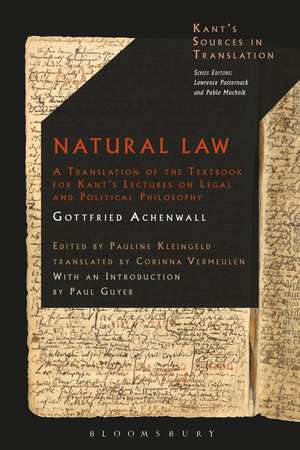Natural Law: A Translation of the Textbook for Kant’s Lectures on Legal and Political Philosophy: Kant’s Sources in Translation
Editat de Dr Pauline Kleingeld Introducere de Dr Paul Guyer Traducere de Corinna Vermeulen Autor Dr Gottfried Achenwallen Limba Engleză Hardback – 19 feb 2020
| Toate formatele și edițiile | Preț | Express |
|---|---|---|
| Paperback (1) | 216.17 lei 6-8 săpt. | |
| Bloomsbury Publishing – 20 oct 2021 | 216.17 lei 6-8 săpt. | |
| Hardback (1) | 817.53 lei 3-5 săpt. | |
| Bloomsbury Publishing – 19 feb 2020 | 817.53 lei 3-5 săpt. |
Preț: 817.53 lei
Preț vechi: 1452.76 lei
-44% Nou
Puncte Express: 1226
Preț estimativ în valută:
156.43€ • 163.77$ • 129.44£
156.43€ • 163.77$ • 129.44£
Carte disponibilă
Livrare economică 17-31 martie
Preluare comenzi: 021 569.72.76
Specificații
ISBN-13: 9781350022843
ISBN-10: 1350022845
Pagini: 296
Dimensiuni: 156 x 234 mm
Greutate: 0.59 kg
Editura: Bloomsbury Publishing
Colecția Bloomsbury Academic
Seria Kant’s Sources in Translation
Locul publicării:London, United Kingdom
ISBN-10: 1350022845
Pagini: 296
Dimensiuni: 156 x 234 mm
Greutate: 0.59 kg
Editura: Bloomsbury Publishing
Colecția Bloomsbury Academic
Seria Kant’s Sources in Translation
Locul publicării:London, United Kingdom
Caracteristici
A key source text for a major component of Kant's moral and political philosophy and the basis of his Natural Law lectures
Notă biografică
Pauline Kleingeld is Professor of Philosophy at the University of Groningen, the Netherlands. She is the author of Kant and Cosmopolitanism: The Philosophical Ideal of World Citizenship (2012) and Fortschritt und Vernunft: Zur Geschichtsphilosophie Kants (1995). Corinna Vermeulen (PhD Utrecht, 2007) is a professional translator and has translated Latin works by Grotius, Descartes, and Spinoza. Paul Guyer is the Jonathan Nelson Professor of Humanities and Philosophy at Brown University, USA. He is the author of eleven books on the philosophy of Kant, most recently Virtues of Freedom (2016) and Kant on the Rationality of Morality (2019), as well as of A History of Modern Aesthetics in three volumes (2014).
Cuprins
Editor's Preface Introduction, Paul Guyer Translator's PrefaceIus naturae: Volume I Ius naturae: Volume II Concordances Glossary and Index of Key TermsIndex
Recenzii
An essential source that will be of great interest to anyone working on Kant's political writings, legal history and history of political thought.
Corinna Vermeulen's translation of Achenwall's work allows us to access this neglected thinker's philosophy. We can use this volume to see how Kant developed his own positions in response, particularly in Kant's course lecture using Achenwall's book as a text but also in his published writings. It's important for understanding Kant's political philosophy to see that he was responding to others besides Hobbes, Rousseau, and Locke.
This is an invaluable volume. No branch of Kant's philosophy relies more on historical context than his legal thought, and Achenwall holds the key to it. Scholars interested in the philosophy of law and its history will welcome this book, particularly those whose native tongue is not Latin.
This first English translation makes easily accessible to scholars the handbook on which Kant commented in his courses on natural right, providing an indispensable, yet largely overlooked resource for a better understanding of Kant's juridical and political thought. Corinna Vermeulen's competent translation, which includes helpful emendations to the Latin text, is an important contribution to the studies on the wide-ranging German discussion on natural law theory.
Corinna Vermeulen's translation of Achenwall's work allows us to access this neglected thinker's philosophy. We can use this volume to see how Kant developed his own positions in response, particularly in Kant's course lecture using Achenwall's book as a text but also in his published writings. It's important for understanding Kant's political philosophy to see that he was responding to others besides Hobbes, Rousseau, and Locke.
This is an invaluable volume. No branch of Kant's philosophy relies more on historical context than his legal thought, and Achenwall holds the key to it. Scholars interested in the philosophy of law and its history will welcome this book, particularly those whose native tongue is not Latin.
This first English translation makes easily accessible to scholars the handbook on which Kant commented in his courses on natural right, providing an indispensable, yet largely overlooked resource for a better understanding of Kant's juridical and political thought. Corinna Vermeulen's competent translation, which includes helpful emendations to the Latin text, is an important contribution to the studies on the wide-ranging German discussion on natural law theory.





